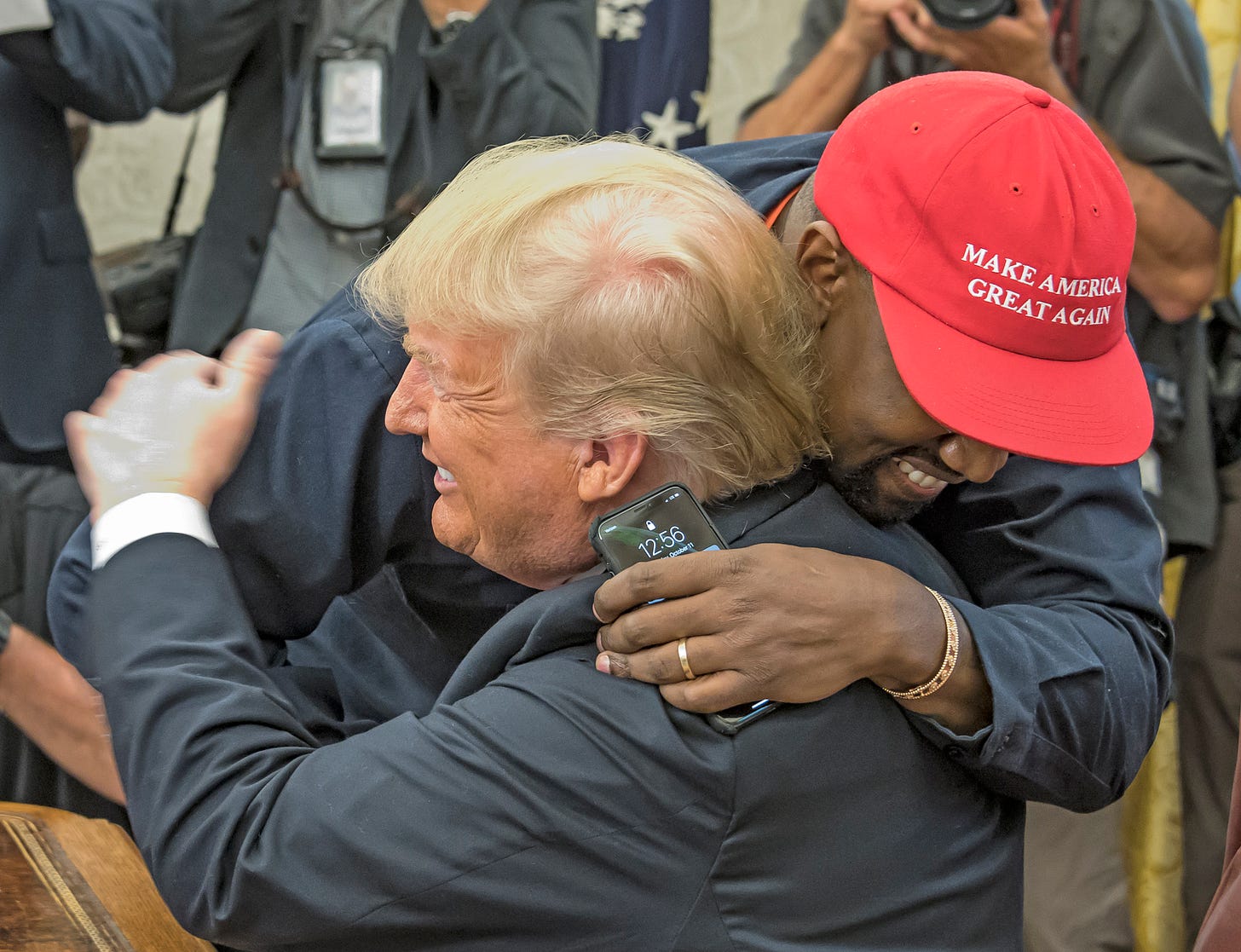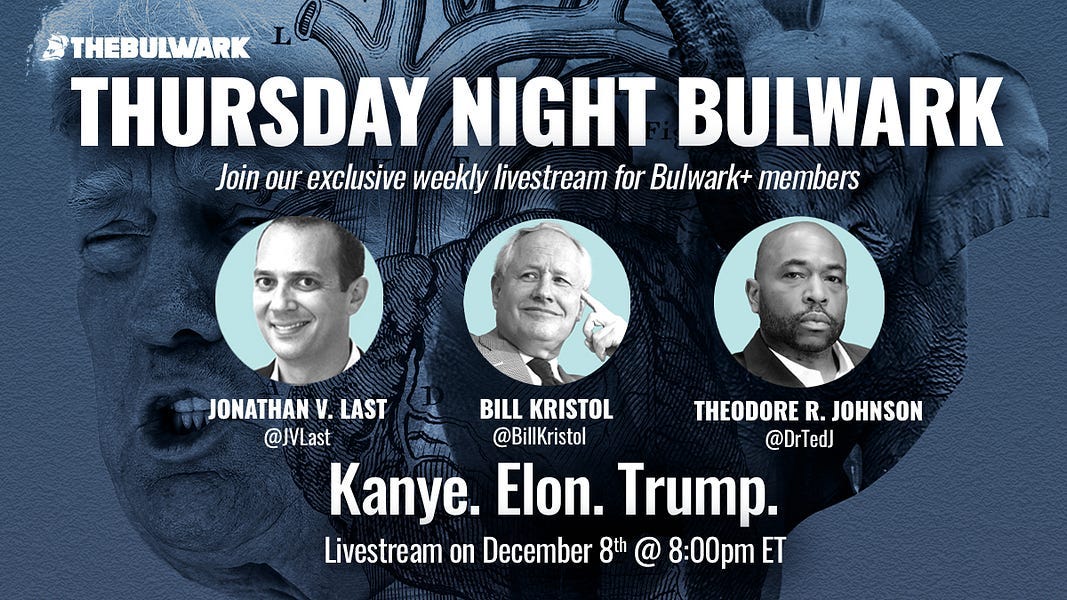On Wednesday, the White House hosted a round table on antisemitism, which seems quite timely, because it feels like we are in a uniquely dangerous moment. As I wrote yesterday: anti-Jewish sentiment is now “arguably more widespread, more virulent and closer to the political mainstream than at any time in recent history.”
And we know one of its leading enablers. My latest in Politico Magazine:
For most Americans, including Republicans, the resurgence of hatred against Jewish people is the return of an ancient evil. But Donald Trump, who has refused to disavow his dinner with two of the country’s most virulent antisemites, apparently sees it very differently.
He sees it as a constituency.
Trump is seldom careful about who he offends — tossing out jibes, insults, and threats with reckless abandon. He is more than willing to lash out at cultural elites and the people he calls “disloyal Jews” who support Democrats. But Trump has been consistent in his reluctance to offend what he regards as a crucial part of the base that he has nurtured over the years. He is unapologetic about associating with overt neo-Nazis, and unwilling to issue full-throated denunciations of antisemitism. Trump is willing to draw this barrage of opprobrium for one simple reason: He believes that he has tapped into something in the American electorate, especially among evangelical Christians, who have ingrained — but complicated — attitudes toward Israel and Jews.
And these are his people.
Trump’s defenders bristle at such charges, noting that Trump’s own daughter, son-in-law and some of his grandchildren are Jewish and that he is a staunch friend of Israel. He moved the embassy to Jerusalem, they say. What about the “Abraham Accords,” they say. But Trumpism (and Trump himself) has given oxygen to renascent antisemitism that has been introduced and normalized — by social media, celebrities and politicians — to a new audience that is impossible to quantify but may number in the millions. A 2020 survey by the Anti-Defamation League found that a majority of Americans “agree with at least one common stereotype about Jews.” While overt antisemitism has declined over the last half-century, the report found that 11 percent of Americans — or more than 28 million Americans — believe in six or more of the 11 anti-Jewish stereotypes tested.
This resurgent antisemitism — a blend of old-fashioned anti-Jewish sentiment, extreme versions of Christian/evangelical nationalism and a deep investment in conspiracism — is not, of course, new. But it is arguably more widespread, more virulent and closer to the political mainstream than at any time in recent history. The last few years have been a master class in the extent to which millions of Americans are willing to believe myths, lies and dark theories about cosmopolitan cabals who threaten the fabric of American life. Attacks on George Soros and “globalists” are now standard attack lines on the American right. Inevitably, though, a worldview obsessed with malign global elites will settle on the Jews as a target of choice.
Amidst all of this, Trump had dinner with a prominent neo-Nazi and Holocaust denier, and a billionaire celebrity rapper who sees “good things in Hitler.”
While Republicans eventually denounced the bigotry — even when they couldn’t bring themselves to name Trump himself — the former president refused to disavow it. This too, has been a consistent pattern, dating back long before his embrace of the “very fine people” who chanted “Jews will not replace us,” in Charlottesville.
As usual, it is not clear whether Trump, a man of few ideas and little or no introspection, actually holds antisemitic views. But that is beside the point: He thinks these are his people and he’s not going to abandon them. As the Washington Post’s Philip Bump notes, “Trump has always been desperate to send signals to his base of support that he agrees with and loves them.”
…
Both as a candidate and as president, Trump repeatedly undermined both the stigma of antisemitism and Buckley’s guardrails.
Shortly before the 2016 election, Trump laid out his theory of a vast globalist conspiracy involving Hillary Clinton meeting secretly with “international banks to plot the destruction of U.S. sovereignty.”
Time magazine called this his “Grand Unified Campaign Conspiracy Theory” that drew upon “conspiracy theories that have been nurtured for years by far-right outlets” like Alex Jones’ InfoWars.
The ADL also expressed alarm when Trump retweeted an image of a “corrupt” Clinton and a Star of David. “We’ve been troubled by the anti-Semites and racists during this political season,” the ADL said in a statement, “and we’ve seen a number of so-called Trump supporters peddling some of the worst stereotypes all through this year.”
The Jewish group was especially concerned that Trump “hasn’t spoken out forcefully against these people. It is outrageous to think that the candidate is sourcing material from some of the worst elements in our society.”
But the pattern had been set.
He was slow to denounce former KKK leader David Duke, and refused to push back against a wave of antisemitic hate directed at Jewish journalists and critics.
During the 2016 campaign, Andrew Anglin, the founder of the neo-Nazi Daily Stormer website, posted an article headlined: “Empress Melania Attacked by Filthy Russian K--e Julia Ioffe in GQ,” featuring a picture of Ioffe wearing a Nazi-era yellow star with the word “Jude” and a call to action from Anglin: “Please go ahead and send her a tweet and let her know what you think of her dirty k--e trickery. Make sure to identify her as a Jew working against White interests, or send her the picture with the Jude star from the top of this article.”
When Trump was asked by CNN’s Wolf Blitzer about the antisemitic attacks and death threats, the future president refused to condemn them, saying “I don’t have a message to the fans. A woman wrote an article that was inaccurate.”
Trump’s refusal to denounce the outpouring of hate was greeted with delight by Anglin, who immediately posted: “Glorious Leader Donald Trump Refuses to Denounce Stormer Troll Army.” (Last week, Musk restored Anglin’s account on Twitter.)
After decades of fending off cranks, crackpots, and antisemites, the alt-right had brought them back into the political bloodstream with the acquiescence of the GOP nominee.
And then came Charlottesville.
And Marjorie Taylor Greene and “Jewish space lasers.”
And QAnon.
Meanwhile, Fox News began mainstreaming the “Great Replacement Theory,” and whitewashing the antisemitism of Ye, formerly known as Kanye West by editing out his anti-Jewish comments.
In October, when Trump complained about ungrateful Jews, there was little or no pushback from Republicans.
After Ye tweeted that he was “going death con3 on JEWISH people,” the former president invited him to dinner. He came with a notorious neo-Nazi.
And, once again, Trump offered no apology. He doesn’t think he has to, because his base doesn’t mind. These are his people. And he needs them.
You can read the whole thing here.
The Trump Effect
Forty-two points!
Ron DeSantis Isn’t The Savior
ICYMI: On yesterday’s podcast, I talked with the Atlantic’s Mark Leibovich about Georgia and his deep-dive into the GOP’s Great Florida Hope: “Just Wait Until You Get to Know Ron DeSantis.”
You can listen to the whole thing here.
Quick Hits
1. How Trump and MAGA Allies Are Defending Violent Jan. 6th Rioters
Your daily must-read in the Bulwark: Amanda Carpenter on Trump’s embrace of the insurrectionists.
Although it would be unwise to take at face value Donald Trump’s word that he is financially supporting anyone, he has said he is supporting the legal defenses for some Jan. 6th rioters. How and who remains unclear, but it would be reasonable to think that if he is, it would be through PFP, since he just recorded a video praising the organization.
What is perfectly clear is how keen Trump, his allies, and his aides are to show their solidarity with PFP, an organization that supports rioters who engaged in violence against police officers. This comes in many forms: joint events; promises of monetary support, pardons, and official apologies from the government; and investigations into the circumstances of their prosecution and detainment.
2. Turnout by Republicans Was Great. It’s Just That Many of Them Didn’t Vote for Republicans.
In the key Senate states mentioned in this article, Republican House candidates received more votes than Democratic ones. The final Times/Siena polls showed that voters in Pennsylvania, Georgia, Arizona and Nevada preferred Republican control of the Senate.
It’s fair to say voters in these key states probably preferred Republican control of government, in no small part because more Republicans showed up to vote. They just didn’t find Republican candidates they wanted to support at the top of the ticket.
3. The Democrats’ Tenuous Hold on the Suburbs
Ruy Teixeira with a reality check:
Democrats’ hold on the suburban vote—such as it is—is far more tenuous than might be implied by the popular image of socially liberal, college-educated suburban voters who can no longer countenance voting for the GOP under any circumstances. Democrats’ target suburban voters must necessarily include legions of moderate and/or working class voters who might not draw as much sustenance from a steady diet of anti-MAGAism as Democrats anticipate.
And just how much hold do the Democrats have on suburban voters anyway? In the AP/NORC VoteCast survey, the most reliable election survey available, Democrats carried suburban voters nationwide by a single point in 2022. That’s a slippage of 9 points from the Democrats’ 10 point margin in 2020. Interestingly, the slippage in Democratic support from 2020 to 2022 was actually larger among nonwhite than white suburban voters.
These data indicate strongly that Democrats might not be in quite the catbird seat they think they are with suburban voters and therefore with the 2024 election. But they appear to have a touching faith that the anti-MAGA playbook will work anytime anywhere.
Join us!
Bill Kristol and Ted Johnson will join Jonathan V. Last for this week’s edition of Thursday Night Bulwark where they will discuss all the goings on since the mid-terms wrapped up. Join the gang starting at 8:00pm ET on Thursday, December 8th.
Exclusively for Bulwark+ members.









Trump makes all fanatics on the right, of whatever stripe, feel heard. Trumpism increasingly looks like a coalition of various fanaticisms united by a shared hatred of the American mainstream. Trump understands fanatics are dangerous and wants the menace they represent lined up behind him. The threat this represents to the ideals on which democratic and constitutional governance rest cannot be overstated.
I was talking with my work hag the other day and we got onto the MTG/Hot Garbage subject. She said MTG/HG was just vile, and while I agreed she *is*, I said the bigger problem is MTG/HG's VOTERS. She is a reflection of her voter base...so it is her voter base who are the truly vile human beings. The same can be said for Gosar, Gaetz, Perry, and all the other members of the Trash Can Caucus on the GOP side. Think of these politicians as the head of the cyst. Unless you clear out the sac (AKA the strong garbage quotient of their voting bases), then people like this will keep getting elected.
I do not believe in the "don't attack the voters" principle. If people are being bad citizens AND bad human beings, CALL THEM OUT. Call them out every time they cross your path. It is no sin to point out truly bad people, and if you as a voter think that Matt Gaetz and Paul Gosar and that imbecile Tuberville are good reflections of your views and opinions, then surprise--you are a terrible person and deserve to get read for filth the house down for it. If you don't want to be read for filth, then here's your fix--don't be a crap person, and don't give your vote to crap people.
Off the soapbox now...